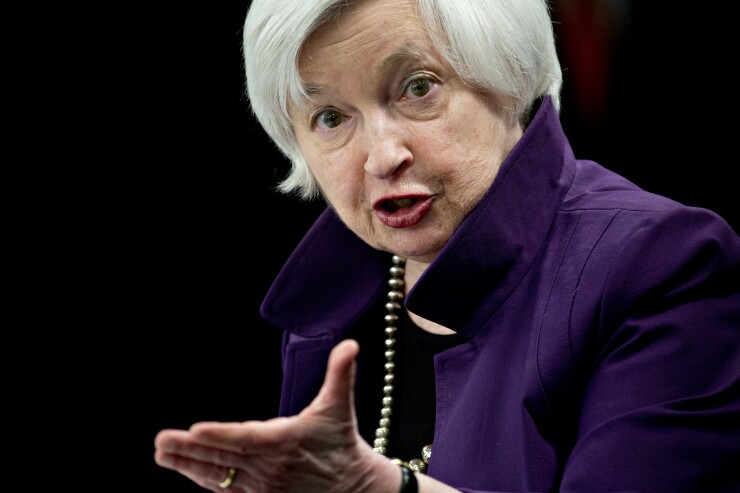
WASHINGTON — The Financial Stability Oversight Council approved new guidance Friday that will allow it to more easily designate nonbanks as systemically important financial institutions, while also issuing a new analytic framework the council says will provide clarity on how they identify systemic risks.
"When large, interconnected financial companies failed in 2007 and 2008, stress spread through the financial system and then to the real economy," FSOC Chair Secretary Janet Yellen said at an open session. "Recent stresses in some financial sectors arising from the onset of the pandemic and the sudden failures of some regional banks underscored the continuing need to remain vigilant to threats to ensure the resilience of the financial system and our economic strength."
The vote to approve the guidance and framework finalizes a previously
The FSOC was established by the Dodd Frank Act and is populated by the heads of all financial regulatory agencies, including the Federal Deposit Insurance Corp., the Office of the Comptroller of the Currency and the Federal Reserve. One of its major functions under the act was the ability to designate systemically important financial institutions and subject them to enhanced regulation — a power that Congress sought after the financial crisis required major cash injections for insurance giant AIG and other nonbank firms. Though approval of the proposals widens the ability to designate companies, Dodd Frank also gave FSOC the power to designate
"The guidance maintains strong procedural protections for companies under review, including significant council engagement and communication and provides them with opportunities to be heard," said Yellen. "Designation is only one of the council's tools and is not being prioritized over other approaches to addressing financial stability risks."
The council designated four companies — AIG, GE Capital, Prudential and MetLife — during the Obama administration, though those designations were later rescinded, or struck down by a court in MetLife's case. No U.S. nonbanks are currently designated as systemically important financial institutions. The Trump administration later issued guidance in 2019 that raised the evidentiary standard for designation in such a way that effectively rendered that authority moribund.
Secretary Yellen emphasized that the updated standards do not alter the authority vested in the agency by Congress, noting that under the law a nonbank financial company will continue to be designated only if the council determines that the company's distress or its activities could pose a threat to U.S. financial stability.
Political pressure from the left has been mounting for the Treasury to act to restore the council authority to designate nonbank SIFIs. Sen. Elizabeth Warren, D-Mass., sent
"Nonbank financial institutions (nonbanks) were 'major contributors' to the 2008 financial crisis and also posed evident risks to the financial system during the 2020 Covid-19 pandemic," she wrote. "The rapid growth of these entities — hedge funds, insurance companies, asset managers, money market funds, and more — and their aggressive lending calls for an 'urgent need' to address their growing threats to U.S. financial stability."
Republicans like Patrick McHenery, R-N.C., have written
As part of the new rules, the FSOC's designation process will have two parts. The first part is interpretive guidance
FDIC Chairman Martin Gruenberg previously
"These authorities serve as a basis to begin to address the systemic risk concerns presented by nonbank financial institutions, namely the lack of transparency, prudential supervision and controls on the use of leverage," he said. "The analytic framework will enhance the transparency of the FSOC's process for considering financial stability risk, and the interpretive guidance will restore the practical use of the designation authority."
Acting Comptroller Michael Hsu struck a similar tone, saying he is glad to see FSOC able to exercise the mandate it was given in the Dodd Frank Act.
"It's important that the council have the ability or willingness and the people, processes and systems in place to use them when warranted,' he said. "This guidance and the analytic framework help strike the right balance for enabling that."
Consumer Financial Protection Bureau Director Rohit Chopra said he is glad the Trump-era rules — which he characterized as having obstructed FSOC's authority to designate — were rescinded to allow more risky firms to be regulated like the largest banks.
"Designated firms may be required to have more skin in the game to absorb losses, more cash on hand to mitigate the impact of runs and file living wills to demonstrate the firm can fail without extraordinary government assistance," he said. "I strongly support today's important step toward the goal of promoting market discipline by removing certain obstacles related to designation proceedings that were not grounded in law."





